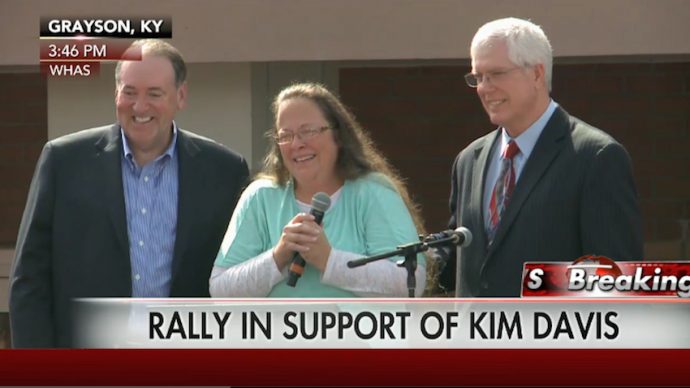Here’s the first of two excerpts from articles saying the same thing — and saying it well. They’re both deserving of their own post. A president must understand the U.S. Constitution — if they don’t, they have no business serving as the chief executive as outlined in Article II. First up is Bryan Fischer:
In the 2016 presidential race, there are 17 declared candidates for the GOP nomination and six for the Democrat nomination. How do evangelicals and social conservatives begin the sorting process to decide who is worthy of their vote?
The place to begin is with the candidates’ position on the incarceration of Rowan County clerk Kim Davis. Her incarceration, I would suggest, is THE defining moment of the presidential campaign, particularly on the GOP side.
The question for each candidate is simple: do you support Kim Davis or do you condemn her?
Candidates who support Kim Davis understand the importance of religious liberty, freedom of conscience, the First Amendment, and the limitations the Constitution places on the tyrannical overreach of the federal judiciary.
Candidates who think Kim Davis belongs in jail or should lose her job do not understand any of those things.
Candidates, in talking about Mrs. Davis, have divided themselves along one simple fault line: is a Supreme Court ruling “the law or the land” or is it not?
Worthy candidates understand the reality that the Supreme Court in fact cannot possibly make law. The power to make law under the Constitution is reserved exclusively, without exception, to Congress. “All legislative Powers,” it says, “shall be vested in…Congress.”
In simplest possible terms, this means if Congress didn’t do it, it’s not a law.
Congress has never passed a law imposing sodomy-based marriage on the United States. In fact, the relevant law that Congress has passed, the Defense of Marriage Act, explicitly protects Kentucky’s right to define marriage for itself with no interference from the federal government, including the judiciary. Kentucky, with the support of 75% of its citizens, has protected man-woman marriage in its state constitution. Under the rule of law, that rightfully should be the end of the matter.
So while a Supreme Court ruling may have the effect of law, due to the meek, abject acquiescence of a compliant and constitutionally uneducated public, the Supreme Court is explicitly forbidden from making law.
The Supreme Court is the supreme court, not the supreme branch of government. As Thomas Jefferson pointed out, the three branches of government are co-equal. No one is superior to the other. As he put it, “The branches are co-equal and co-sovereign within themselves.”
Read more: BarbWire.com
Image credit: barbwire.com.

